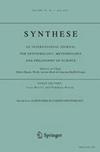一个有固定过去的问题
IF 1.3
1区 哲学
Q1 HISTORY & PHILOSOPHY OF SCIENCE
引用次数: 0
摘要
Lampert最近提出了一种新颖的宿命论论证,结合了模态、时间和认知逻辑的元素,证明固定的过去与开放的未来不相容(分析82(3):426-434,2022)。通过反模型的构建,可以看出他的推理路线是有缺陷的。然而,它也解释了如果兰伯特的论点得到一个关于先验知识的时间状态的额外前提的支持,它是如何被纠正的。这个额外的假设——在最初的演示中是默认的——被证明是最薄弱的环节,并且有人认为,尽管Lampert的保证,它可以在粗略的奥克汉主义框架中被合理地拒绝。因此,结论是,固定的过去不会对开放的未来构成威胁;然而,从对这一新颖论点的仔细反思中,我们可以得出一些关于知识、必要性和时间的不同教训。本文章由计算机程序翻译,如有差异,请以英文原文为准。
A problem with the fixed past fixed
Abstract A novel fatalistic argument that combines elements of modal, temporal, and epistemic logic to prove that the fixed past is not compatible with the open future has recently been presented by Lampert (Analysis 82(3):426–434, 2022). By the construction of a countermodel, it is shown that his line of reasoning is defective. However, it is also explained how Lampert’s argument could be corrected if it were supported with an extra premise regarding the temporal status of a priori knowledge. This additional assumption—which was tacit in the original presentation—is shown to be the weakest link, and it is argued that, despite Lampert’s assurance, it can be plausibly rejected in a roughly Ockhamist framework. Thus, it is concluded that the fixed past poses no threat to the open future; however, a few different lessons about knowledge, necessity, and time are drawn from careful reflection on this novel argument.
求助全文
通过发布文献求助,成功后即可免费获取论文全文。
去求助
来源期刊

Synthese
管理科学-科学史与科学哲学
CiteScore
3.30
自引率
13.30%
发文量
471
审稿时长
1 months
期刊介绍:
Synthese is a philosophy journal focusing on contemporary issues in epistemology, philosophy of science, and related fields. More specifically, we divide our areas of interest into four groups: (1) epistemology, methodology, and philosophy of science, all broadly understood. (2) The foundations of logic and mathematics, where ‘logic’, ‘mathematics’, and ‘foundations’ are all broadly understood. (3) Formal methods in philosophy, including methods connecting philosophy to other academic fields. (4) Issues in ethics and the history and sociology of logic, mathematics, and science that contribute to the contemporary studies Synthese focuses on, as described in (1)-(3) above.
 求助内容:
求助内容: 应助结果提醒方式:
应助结果提醒方式:


